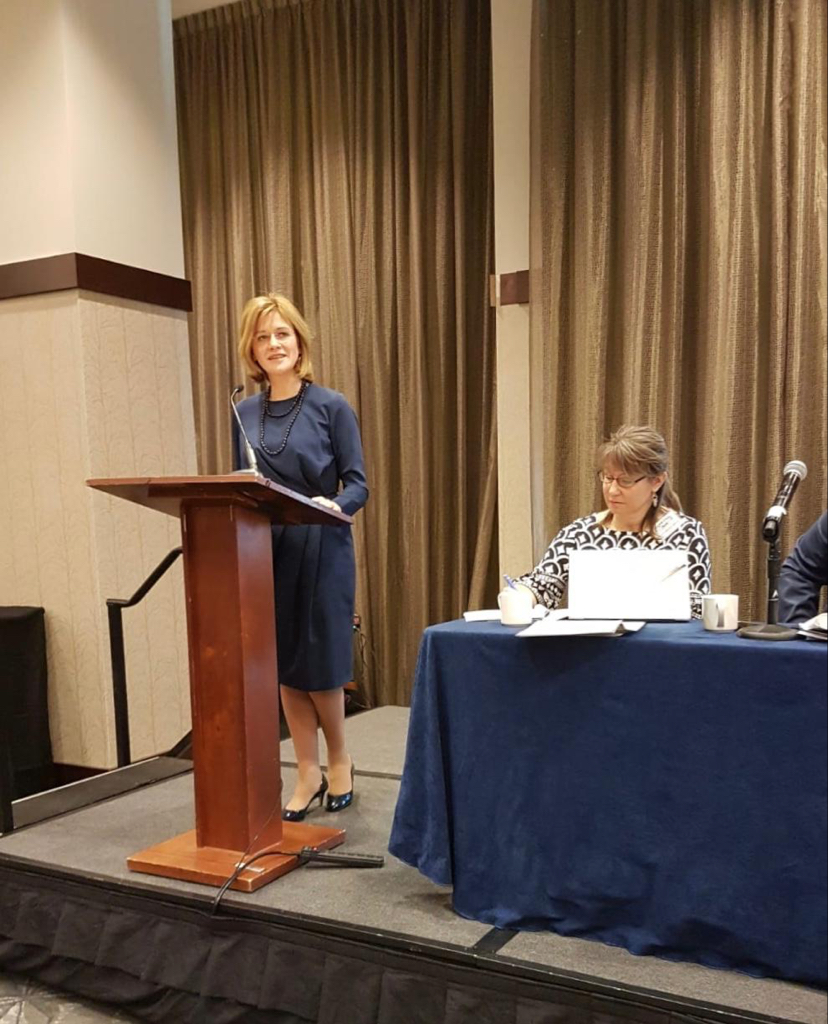The Foreign Ministry’s Parliamentary Secretary Kalniņa-Lukaševica: Latvians worldwide contribute greatly to creating and strengthening the image of Latvia
From 3 to 5 May 2019, the Parliamentary Secretary of the Ministry of Foreign Affairs, Zanda Kalniņa-Lukaševica, took part in the 68th Annual Congress of the American Latvian Association (ALA) in Denver, U.S., and delivered an opening speech for the event. Other welcoming addresses were given by the Ambassador of Latvia to the U.S., Andris Teikmanis, and the Ambassador-at-Large for the Diaspora at the Ministry of Foreign Affairs, Aivars Groza.
The Parliamentary Secretary underlined in her speech that the ALA contribution to the strengthening of Latvia’s security could hardly be underestimated; much had been achieved, and it was vital to attract support from the U.S. for the security of Latvia.
To further strengthen the sense of belonging to Latvia, a lot is being done for sustaining the Latvian language and culture. A new facet has also emerged: cooperation in economy and science, clearly highlighted by the annual World Latvian Economic and Innovation Forum, the Spotlight Latvia conference for businesses in the U.S., and the establishment of the Latvian American Chamber of Commerce, said Zanda Kalniņa-Lukaševica.
She also noted that the year following Latvia’s centenary marked the moment of maturity and self-confidence. The present-day modern Latvianness means self-awareness, opportunities and benefits. This is not the matter of survival and nostalgia as for the earlier generations. There’s no need to fight for restoring Latvia anymore; this is the time for making the country stronger and being proud of it.
A new facet of Latvian identity has emerged: that of belonging to something very special and important, belonging to Latvia, a strong and successful state. This is also a gain for our people across the globe at the individual level, as they are making use of contacts among the Latvian community to explore new opportunities in business, research and science, and a number of other areas, the Parliamentary Secretary concluded.
Latvians all over the world contribute greatly to building and enhancing the image of Latvia. Being aware and proud of belonging to Latvia promotes its profile as a modern, democratic and strong country, as well as its influence worldwide, Zanda Kalniņa-Lukaševica underlined on the second day of the congress, 4 May, in a discussion titled “The old exile community and the new diaspora. How do we hear one another?”.
Against the backdrop of major changes, being aware that belonging to Latvia brings many opportunities at the individual level and that the pride of being a Latvian raises the profile of Latvia worldwide, a broader understanding is formed of the various aspects of Latvianness. This makes it possible to reduce the gap between the so-called old exile and the new diaspora, by underscoring the common features instead and the possibility for anyone to identify them as part of Latvia, said Zanda Kalniņa-Lukaševica.
The Parliamentary Secretary drew the participants’ attention to the diaspora policy being a high priority for the Ministry of Foreign Affairs and the Government, which is evidenced by the increased budget funds channelled, for the most part, in support of learning the Latvian language and sustaining cultural traditions.
In a discussion titled “The old exile community and the new diaspora. How do we hear one another?”, moderated by Tatjana Žagare-Vītiņa, presentation were given by the Chair of the World Federation of Free Latvians (WFFL), Kristīne Saulītis, and the Chair of the Latvian Foundation, Valda Grinberga.
The congress also included a discussion on “Partnership in difficult times: How to develop cooperation between the U.S. and Latvia?” with participation of the Latvian Ambassador to the U.S., Andris Teikmanis, a Member of the European Parliament, Sandra Kalniete, and the Chairman of the ALA, Pēteris Blumbergs. On the second day of the event, Sandra Kalniete delivered a speech on the subject of “My Latvia”. Other topics discussed were economy, science and education, and other ALA priorities.
 Facebook
Facebook






